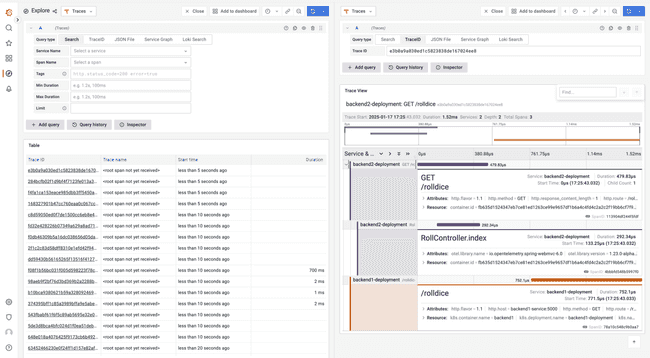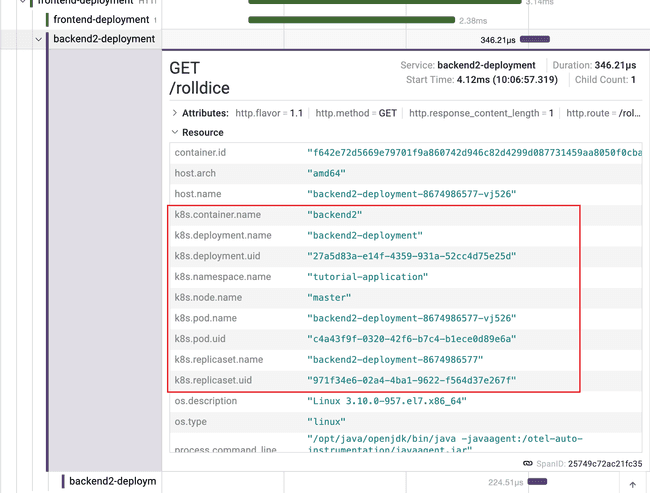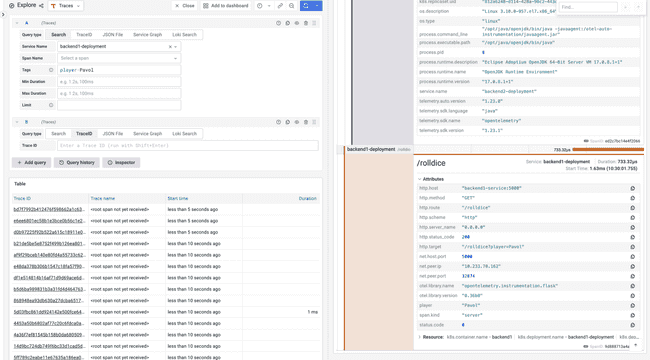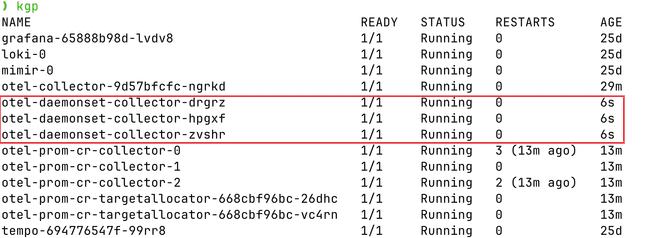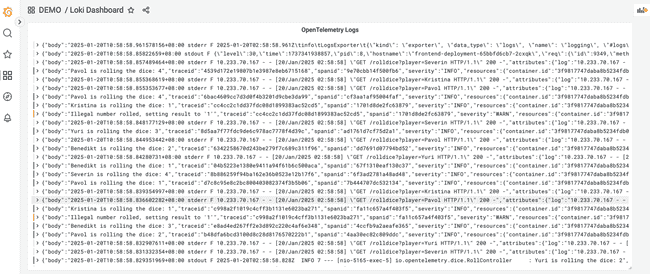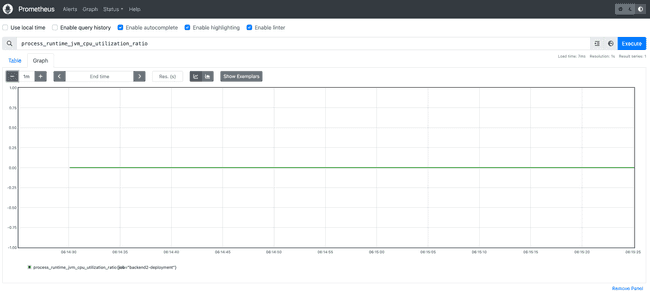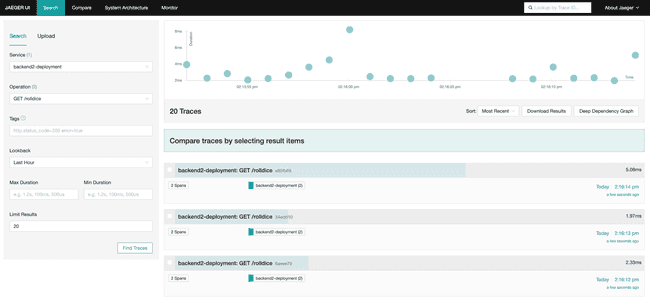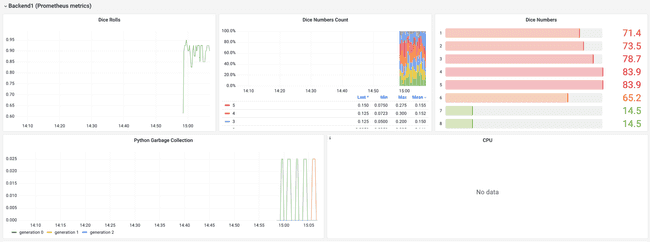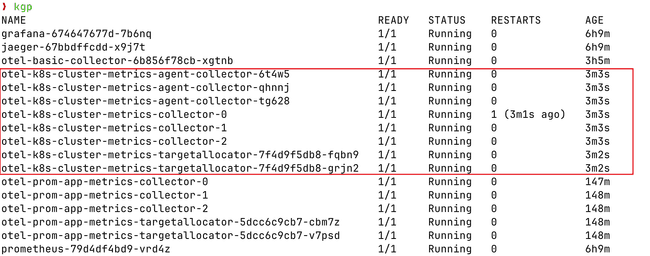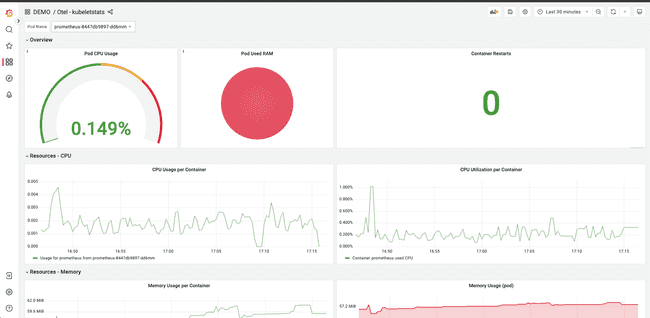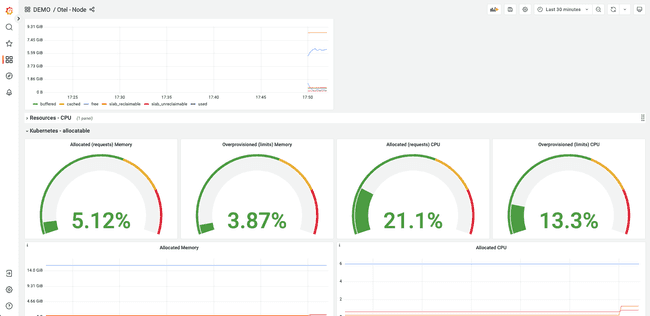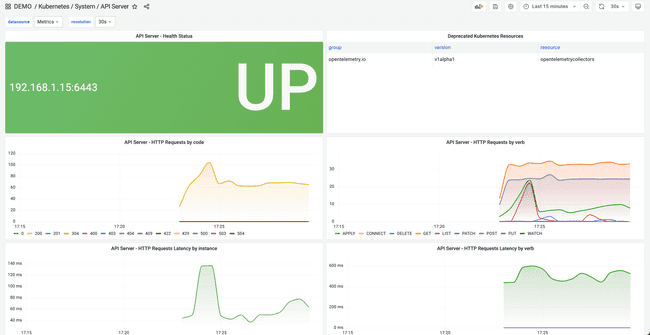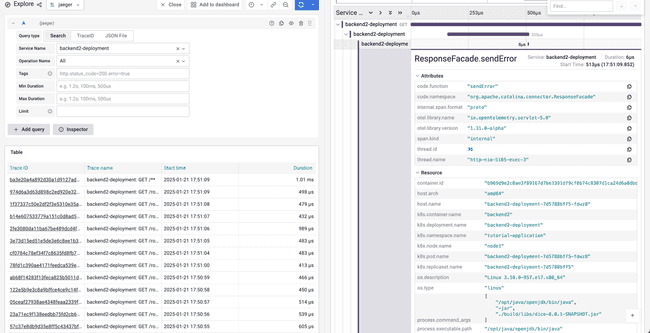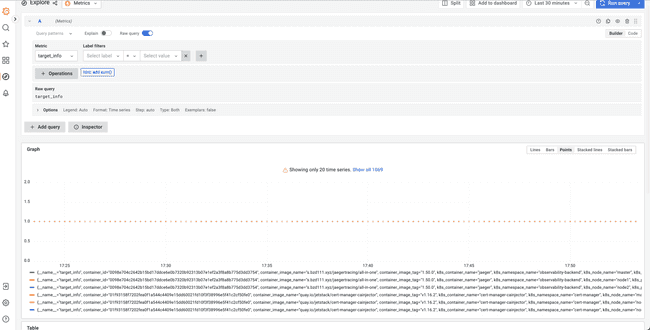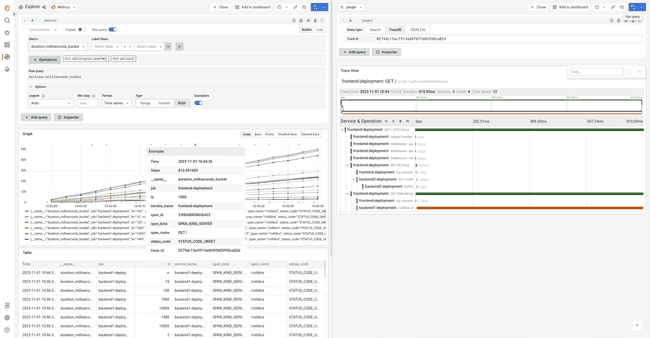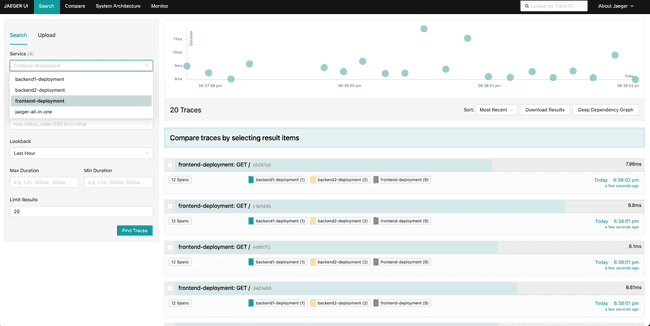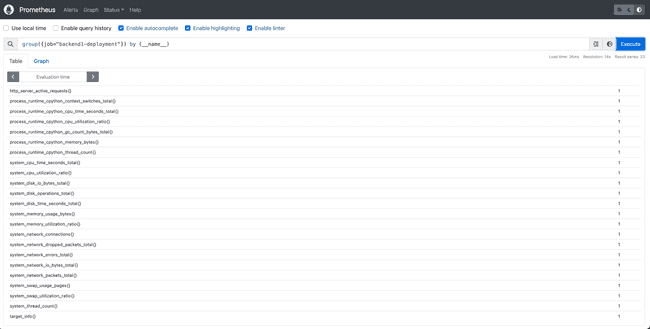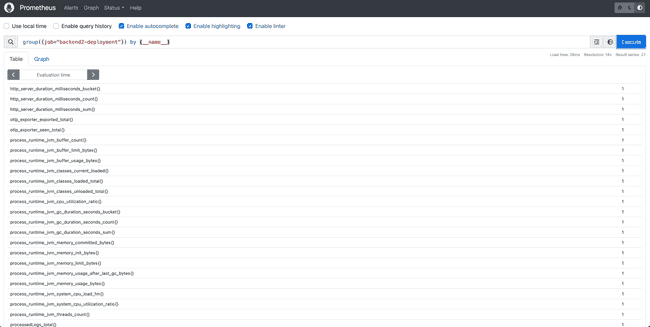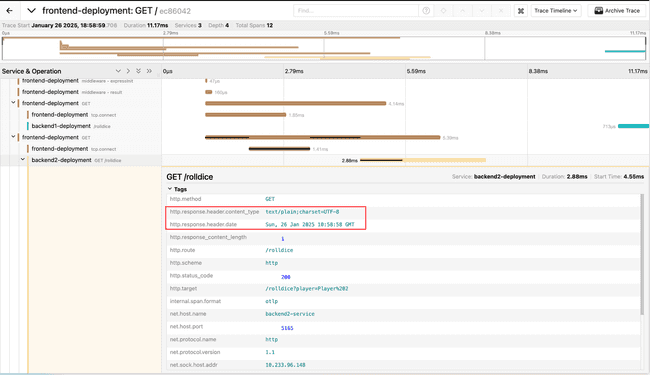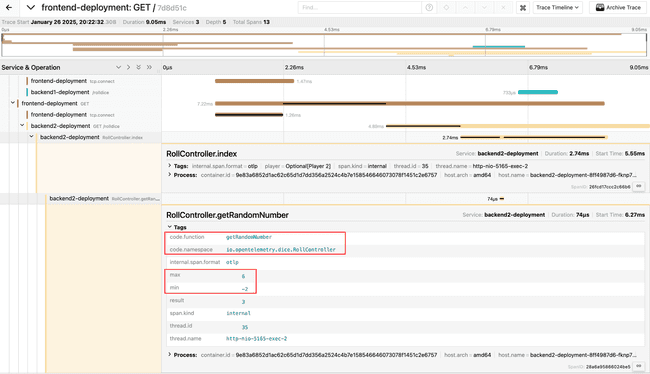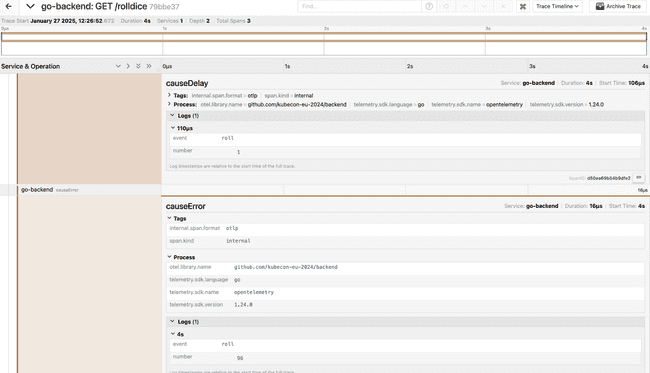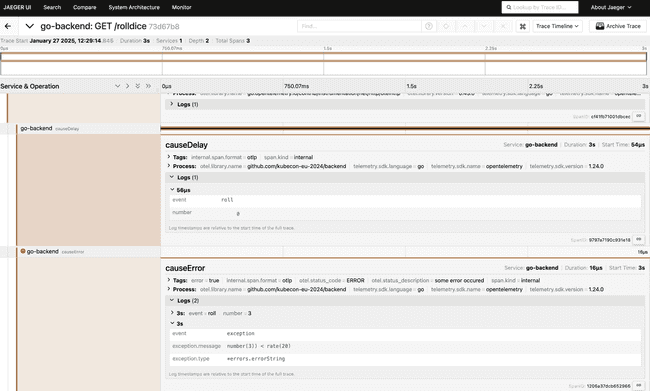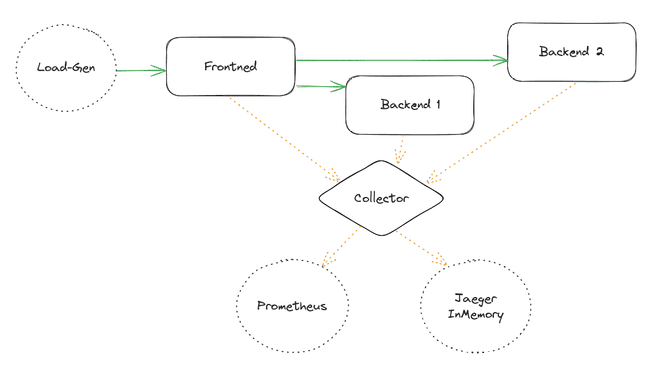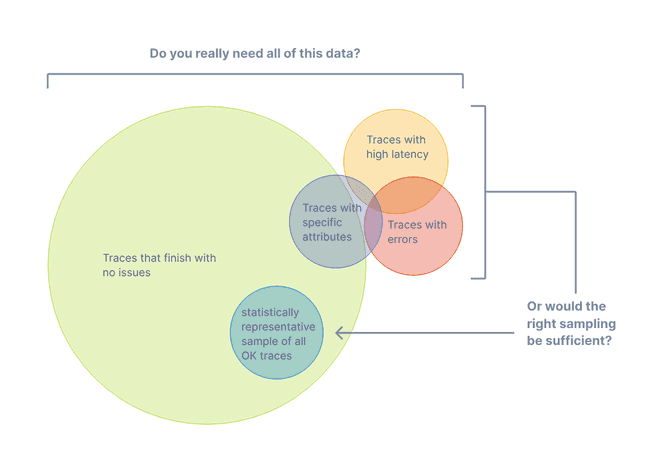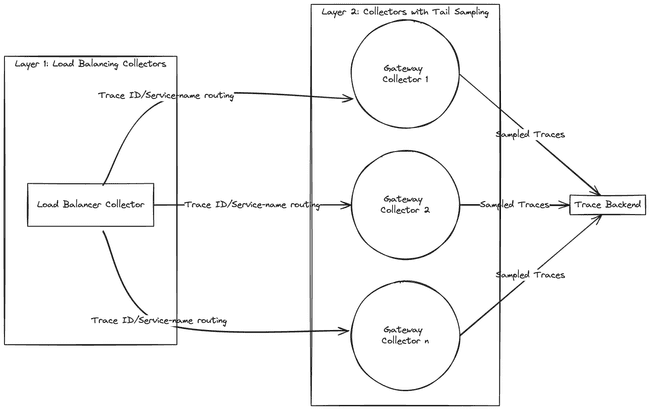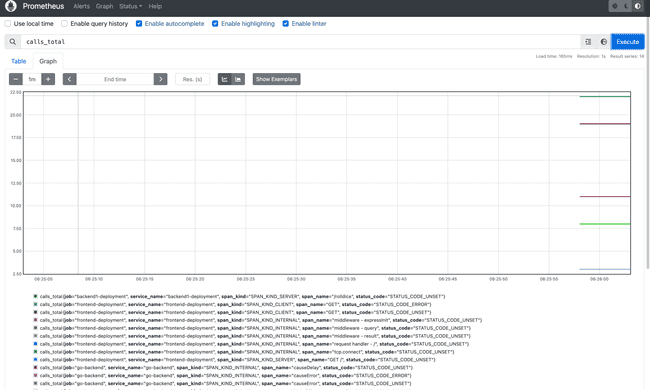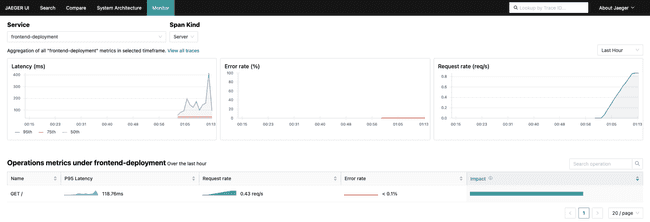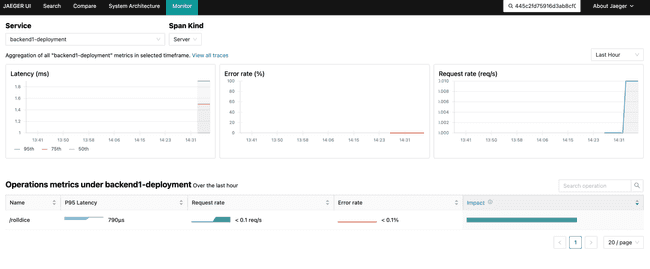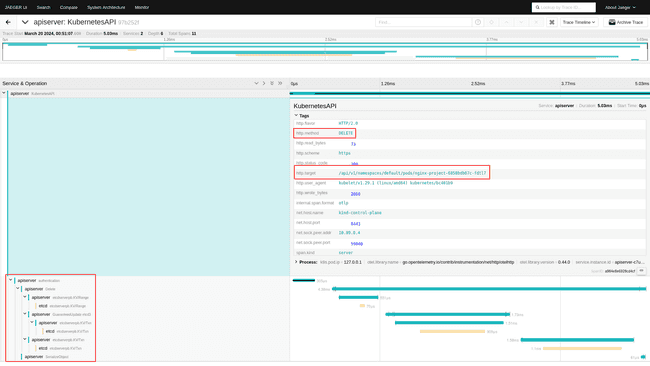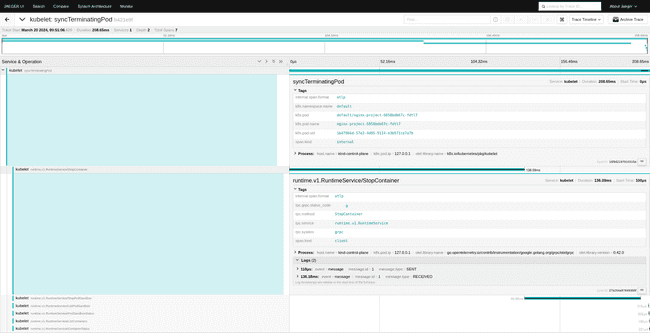otlp学习笔记
OTLP
- MeterProvider is the entry point of the API. It provides access to Meters
- API MeterProvider only provides ability to create a Meter
- SDK MeterProvider accepts configuration for Resource association, metric processing, and exporters
- Meter is responsible for creating Instruments
Instrument is responsible for reporting Measurements
EU 2023
使用的基础设施
observability-backend grafana-65888b98d-lvdv8 1/1 Running 0 25d
observability-backend loki-0 1/1 Running 0 25d
observability-backend mimir-0 1/1 Running 0 25d
observability-backend otel-collector-9d57bfcfc-ngrkd 1/1 Running 0 19m
observability-backend otel-prom-cr-collector-0 1/1 Running 3 (3m44s ago) 4m2s
observability-backend otel-prom-cr-collector-1 1/1 Running 0 4m2s
observability-backend otel-prom-cr-collector-2 1/1 Running 2 (3m45s ago) 4m2s
observability-backend otel-prom-cr-targetallocator-668cbf96bc-26dhc 1/1 Running 0 4m2s
observability-backend otel-prom-cr-targetallocator-668cbf96bc-vc4rn 1/1 Running 0 4m2s
observability-backend tempo-694776547f-99rr8 1/1 Running 0 25d使用 opentelemetry-operator.yaml 0.74 版本
安装完出现两个crd
It manages two CustomResourceDefinitions (CRDs):
opentelemetrycollectors.opentelemetry.io, short nameotelcolinstrumentations.opentelemetry.io, short nameotelinst
❯ k get crd | grep opentelemetry
instrumentations.opentelemetry.io 2025-01-17T07:45:30Z
opentelemetrycollectors.opentelemetry.io 2025-01-17T07:45:31Zotelcol
部署下面的yaml
apiVersion: opentelemetry.io/v1alpha1
kind: OpenTelemetryCollector
metadata:
name: otel
spec:
image: ghcr.io/open-telemetry/opentelemetry-collector-releases/opentelemetry-collector-contrib:0.74.0
mode: deployment # statefulset, daemonset, sidecar
autoscaler:
targetCPUUtilization: 90
minReplicas: 1
maxReplicas: 5
ingress:
hostname: ...
config: | # contains OpenTelemetry collector configuration
receivers:
otlp:
protocols:
grpc:
http:
processors:
batch:
exporters:
logging:
service:
pipelines:
traces:
receivers: [otlp]
processors: [batch]
exporters: [logging]会出现一个svc
❯ kubectl get svc otel-collector -n observability-backend
NAME TYPE CLUSTER-IP EXTERNAL-IP PORT(S) AGE
otel-collector ClusterIP 10.233.2.244 <none> 4317/TCP,4318/TCP,55681/TCP 8m20s增加如下内容
receivers:
jaeger:
protocols:
grpc:
thrift_binary:
thrift_compact:
thrift_http:
service:
pipelines:
traces:
receivers: [otlp, jaeger]
processors: [memory_limiter, batch]会出现两个svc
❯ kubectl get svc |grep otel-collector
otel-collector ClusterIP 10.233.2.244 <none> 14250/TCP,6832/UDP,6831/UDP,14268/TCP,4317/TCP,4318/TCP,55681/TCP 10m
otel-collector-headless ClusterIP None <none> 14250/TCP,6832/UDP,6831/UDP,14268/TCP,4317/TCP,4318/TCP,55681/TCP 10m
otel-collector-monitoring ClusterIP 10.233.31.250 <none> 8888/TCP 10motelinst
The operator use pod mutating webhook to inject auto-instrumentation libraries into starting pods. The webhook adds an init container that copies auto-instrumentation libraries into a volume that is mounted as well to the application container and it configures runtime (e.g. in JVM via JAVA_TOOL_OPTIONS) to load the libraries.
apiVersion: opentelemetry.io/v1alpha1
kind: Instrumentation
metadata:
name: my-instrumentation
namespace: tutorial-application
spec:
exporter:
endpoint: http://otel-collector.observability-backend.svc.cluster.local:4317
propagators:
- tracecontext
- baggage
- b3
sampler:
type: parentbased_traceidratio
argument: "1"
resource:
addK8sUIDAttributes: false
python:
env:
# Required if endpoint is set to 4317.
# Python autoinstrumentation uses http/proto by default
# so data must be sent to 4318 instead of 4317.
- name: OTEL_EXPORTER_OTLP_ENDPOINT
value: http://otel-collector.observability-backend.svc.cluster.local:4318
java:
env:
- name: OTEL_LOGS_EXPORTER
value: otlp增加注解
# js
kubectl patch deployment frontend-deployment -n tutorial-application -p '{"spec": {"template":{"metadata":{"annotations":{"instrumentation.opentelemetry.io/inject-sdk":"true"}}}} }'
# python
kubectl patch deployment backend1-deployment -n tutorial-application -p '{"spec": {"template":{"metadata":{"annotations":{"instrumentation.opentelemetry.io/inject-python":"true"}}}} }'
# java
kubectl patch deployment backend2-deployment -n tutorial-application -p '{"spec": {"template":{"metadata":{"annotations":{"instrumentation.opentelemetry.io/inject-java":"true"}}}} }'完整的调用关系
flowchart LR
subgraph namespace: observability-backend
subgraph pod: collector
OC{OTel Collector}
end
subgraph pod: mimir
OC --metrics-->Mimir
end
subgraph pod: loki
OC --logs-->Loki
end
subgraph pod: tempo
OC --traces-->Tempo
end
subgraph pod: grafana
grafana-.->Mimir
grafana-.->Loki
grafana-.->Tempo
end
end
subgraph namespace: app
subgraph pod: loadgen
LG((loadgen))
end
subgraph pod: frontend
LG --http--> F((frontend)) --metrics,traces--> OC
end
subgraph pod: backend1
F --http--> B1((backend1)) --metrics,traces--> OC
end
subgraph pod: backend2
F --http--> B2((backend2)) --logs,metrics,traces--> OC
end
end
前端触发一下,能在grafana里看到,
同时我们也看看注入的内容
containers:
- env:
- name: OTEL_EXPORTER_OTLP_ENDPOINT
value: http://otel-collector.observability-backend.svc.cluster.local:4318
- name: PYTHONPATH
value: /otel-auto-instrumentation/opentelemetry/instrumentation/auto_instrumentation:/otel-auto-instrumentation
- name: OTEL_TRACES_EXPORTER
value: otlp
- name: OTEL_EXPORTER_OTLP_TRACES_PROTOCOL
value: http/protobuf
- name: OTEL_METRICS_EXPORTER
value: otlp
- name: OTEL_EXPORTER_OTLP_METRICS_PROTOCOL
value: http/protobuf
- name: OTEL_SERVICE_NAME
value: backend1-deployment
- name: OTEL_RESOURCE_ATTRIBUTES_POD_NAME
valueFrom:
fieldRef:
apiVersion: v1
fieldPath: metadata.name
- name: OTEL_RESOURCE_ATTRIBUTES_NODE_NAME
valueFrom:
fieldRef:
apiVersion: v1
fieldPath: spec.nodeName
- name: OTEL_PROPAGATORS
value: tracecontext,baggage,b3
- name: OTEL_TRACES_SAMPLER
value: parentbased_traceidratio
- name: OTEL_TRACES_SAMPLER_ARG
value: "1"
- name: OTEL_RESOURCE_ATTRIBUTES
value: k8s.container.name=backend1,k8s.deployment.name=backend1-deployment,k8s.namespace.name=tutorial-application,k8s.node.name=$(OTEL_RESOURCE_ATTRIBUTES_NODE_NAME),k8s.pod.name=$(OTEL_RESOURCE_ATTRIBUTES_POD_NAME),k8s.replicaset.name=backend1-deployment-759d95c666Resource attributes
资源属性
There are several ways how essential Kubernetes resource attributes (Namespace, Deployment, ReplicaSet, Pod name and UIDs) can be collected:
- The
InstrumentationCR - operator injects the attributes to the application container viaOTEL_RESOURCE_ATTRIBUTESenv var. The OpenTelemetry SDK used in the auto-instrumentation reads the variable. - The
OpenTelemetryCollectorCR - the k8sattributesprocessor enriches spans with attributes in the collector - The
OpenTelemetryCollectorCR - in thesidecarmode use resourcedetectionprocessor. The operator setsOTEL_RESOURCE_ATTRIBUTESwith Kubernetes resource attributes and the variable can be consumed byenvdetector see the blog post for more details.
修改otelinst,然后重启服务。
Let’s enable collection of Kubernetes UID attributes. Update the Instrumentation CR:
kubectl edit instrumentations.opentelemetry.io my-instrumentation -n tutorial-application
spec:
resource:
addK8sUIDAttributes: trueThe resource attributes are injected to the application container, to apply the change on already running applications a restart is required:
kubectl rollout restart deployment -n tutorial-application -l app=backend1
kubectl rollout restart deployment -n tutorial-application -l app=backend2
kubectl rollout restart deployment -n tutorial-application -l app=frontend
Sampling
采样控制
Sampling in OpenTelemetry SDK and auto-instrumentations is configured via OTEL_TRACES_SAMPLER and OTEL_TRACES_SAMPLER_ARG environment variables. In our demo these environment variables are configured in the Instrumentation CR.
Let’s change the sampling rate (argument) to sample 25% of requests:
kubectl edit instrumentations.opentelemetry.io my-instrumentation -n tutorial-application
# add
spec:
sampler:
type: parentbased_traceidratio
argument: "0.25"PII and data manipulation
The collector can add, change and/or remove data that is flowing through it (spans, attributes etc.). This is useful to extract new attributes that can be later used for querying. Second use-case for data manipulation is to handle personally identifiable information (PII).
The following collector processors can be used for data manipulation:
- attributesprocessor removes attributes.
- filterprocessor removes spans and attributes. It supports regex.
- redactionprocessor deletes span attributes that don’t match a list of allowed span attributes.
- transformprocessor modifies telemetry based on configuration using the OpenTelemetry Transformation Language.
kubectl edit opentelemetrycollectors.opentelemetry.io otel -n observability-backend
# add
processors:
attributes:
actions:
- key: "http.target"pattern: ^.*\?player=(?P<player>.*)
action: extract
service:
pipelines:
traces:
processors: [memory_limiter, attributes, batch]Metrics
Prometheus Target Discovery
Service and Pod Monitors
If you have services already generating metrics for prometheus, the collector can collect those using the prometheus receiver, which scrapes metric endpoints provided in a scrape_config like the one below:
- job_name: 'otel-collector'scrape_interval: 10s
static_configs:
- targets: [ '0.0.0.0:8888' ]This solution works but requires writing out all known targets. When services being deployed are added or changed, it will require updating this configuration. An alternative to this is to set up Prometheus Service and Pod Monitors. This allows for discovering metric endpoint dynamically and without needing to modify the collector configuration and restart all collectors.
In order to apply a pod or service monitor, the CRDs need to be installed:
kubectl apply -f https://raw.githubusercontent.com/prometheus-operator/prometheus-operator/main/example/prometheus-operator-crd/monitoring.coreos.com_servicemonitors.yaml
kubectl apply -f https://raw.githubusercontent.com/prometheus-operator/prometheus-operator/main/example/prometheus-operator-crd/monitoring.coreos.com_podmonitors.yaml
``Target Allocator
A service called the Target Allocator can use the prometheus service and pod monitor to discover targets. The target allocator discovers the targets and then distributes both discovered and configured targets among available collectors. It must be deployed alongside a Statefulset of collectors.
部署 target allocator
backend/03-collector-prom-cr.yaml
给服务增加service monitor backend/04-servicemonitors.yaml
Logs
FileLog receiver
Filelog receiver is one of the various Receivers available on OpenTelemetry Collector Contrib.
In order to demonstrate the logs instrumentation, we have to get the OpenTelemetry Instance running as a Daemonset:
filelog:
include:
- /var/log/pods/*/*/*.log
#Each operator fulfills a single responsibility,
#such as reading lines from a file, or parsing JSON
#from a field. Operators are then chained together
#in a pipeline to achieve a desired result.
operators:
# Parse CRI-O format
- type: regex_parser
id: parser-crio
regex: '^(?P<time>[^ Z]+) (?P<stream>stdout|stderr) (?P<logtag>[^ ]*) ?(?P<log>.*)$'output: extract_metadata_from_filepath
timestamp:
parse_from: attributes.time
layout_type: gotime
layout: '2006-01-02T15:04:05.999999999Z07:00'In order to demonstrate the logs instrumentation, we have to get the OpenTelemetry Instance running as a Daemonset:

OpenTelemetry Collector running as DaemonSet
kubectl apply -f https://raw.githubusercontent.com/pavolloffay/kubecon-eu-2023-opentelemetry-kubernetes-tutorial/main/backend/05-collector-daemonset.yaml页面上可以看到日志了
Roadmap
OpenTelemetry Operator Roadmap
Golang auto-instrumentation.
- Adding OpenTelemetry instrumentation to Go applications without having to modify their source code.
OpAMP Bridge.
- Open Agent Management Protocol (OpAMP) is a network protocol for remote management of large fleets of data collection Agents. The complete specification can be found here.
Simplifying the Operator CRDs.
- In order to get the OpenTelemetryCollector easier to be deployed, we are experimenting an opinionated CRDs, which will have the cofig file declared as parameters.
Configuration reload when collector running as Sidecar.
- When the OpenTelemetryCollector instance is running a sidecar will get reloaded if the config parameter changes
NA 2023
基础设施
使用的是v0.88.0版本的opentelemetry-operator,0.74版本不支持go
Auto-instrumentation
By today the OpenTelemetry Operator offers two CustomResouceDefinitions.
- The
v1alpha1.Instrumentationcan be used to configure applications that are configured with the OpenTelemetry-SDK and injection of auto-instrumentation libraries. Currently Apache HTTPD, DotNet, Go, Java, Nginx, NodeJS and Python are supported. Readme - The
v1alpha1.OpenTelemetryCollectorsimplifies the operation of the OpenTelemetry Collector on Kubernetes. There are different deployment modes available, breaking config changes are migrated automatically, provides integration with Prometheus (including operating on Prometheus Operator CRs) and simplifies sidecar injection.
apply 这个yaml,
---
apiVersion: opentelemetry.io/v1alpha1
kind: Instrumentation
metadata:
name: demo-instrumentation
namespace: tutorial-application
spec:
exporter:
endpoint: http://jaeger-collector.observability-backend.svc.cluster.local:4317
env:
- name: OTEL_EXPORTER_OTLP_METRICS_PROTOCOL
value: http/protobuf
- name: OTEL_EXPORTER_OTLP_METRICS_ENDPOINT
value: http://prometheus.observability-backend.svc.cluster.local:80/api/v1/otlp/v1/metrics
- name: OTEL_METRICS_EXPORTER
value: otlp
- name: OTEL_LOGS_EXPORTER
value: none
propagators:
- tracecontext
- baggage
- b3
sampler:
type: parentbased_traceidratio
argument: "1"patch一下deployment
kubectl patch deployment backend2-deployment -n tutorial-application -p ’{“spec”: {“template”:{“metadata”:{“annotations”:{”instrumentation.opentelemetry.io/inject-java”:“true”}}}} }’
本地转发
kubectl port-forward -n observability-backend svc/prometheus 8080:80
kubectl port-forward -n observability-backend svc/jaeger-query 16686:16686
可以在granfa、jaeger分别看到metric、traces
Collector Overview

The OpenTelemetry Collector can be divided into a few major components.
- Receivers: Collect data from a specific source, like an application or infrastructure, and convert it into pData (pipeline data). This component can be active (e.g. Prometheus) or passive (OTLP).
- Processors: Manipulates the data collected by receivers in some way. For example, a processor might filter out irrelevant data, or add metadata to help with analysis. Examples include the batch or metric renaming processor.
- Exporters: Send data to an external system for storage or analysis. Examples of exporters are Prometheus, Loki or the OTLP exporter.
- Extensions: Add additional functionality to OpenTelemetry collector that is not strictly related to the telemetry data, like configuring a bearer token or offering a Jaeger remote sampling endpoint.
- Connectors: Is both an exporter and receiver. It consumes data as an exporter in one pipeline and emits data as a receiver in another pipeline.
The components are composed into pipelines, that are separated by signal type (metrics, traces, logs). Each datapoint is then goes through the chain consisting receiver(s) -> processor(s) -> exporter(s). For more details, check the offical documentation.
apply yaml
apiVersion: opentelemetry.io/v1alpha1
kind: OpenTelemetryCollector
metadata:
name: otel-basic
namespace: observability-backend
spec:
image: ghcr.io/open-telemetry/opentelemetry-collector-releases/opentelemetry-collector-contrib:0.88.0
mode: deployment
replicas: 1
ports:
- port: 8888
protocol: TCP
name: metrics
config: |
receivers:
otlp:
protocols:
grpc:
endpoint: 0.0.0.0:4317
processors:
batch:
exporters:
debug:
verbosity: detailed
service:
pipelines:
metrics:
receivers: [otlp]
processors: [batch]
exporters: [debug]Collecting Prometheus Metrics
介绍了两种方法。
1. Configure Prometheus Target Discovery
使用传统的Prometheus Configuration的方式。
graph LR;
svc(Service)
subgraph OpenTelemetry Collector
pr(Prometheus Receiver)
pros(Processors)
prw(Prometheus Remote Write Exporter)
end
prom(Prometheus Server)
pr -->| /metrics | svc;
pr --> pros;
pros --> prw;
prw --> |push |prom;
otelcol配置
kind: OpenTelemetryCollector
metadata:
name: otel-prom-collector
spec:
mode: statefulset
replicas: 1
config: |
receivers:
prometheus:
config:
scrape_configs:
- job_name: 'otel-collector'
scrape_interval: 10s
static_configs:
- targets: [ '0.0.0.0:8888' ]
metric_relabel_configs:
- action: labeldrop
regex: (id|name)
- action: labelmap
regex: label_(.+)
replacement: $$1
exporters:
logging:
loglevel: debug
prometheus:
endpoint: 0.0.0.0:8989
metric_expiration: 10m
prometheusremotewrite:
endpoint: http://prometheus.observability-backend.svc.cluster.local:80/api/v1/write
service:
pipelines:
metrics:
exporters:
- prometheusremotewrite
- logging
processors: []
receivers:
- prometheus2. Scaling metrics pipeline with the target allocator
sequenceDiagram
participant Target Allocator
participant Metrics Targets
participant OTel Collectors
Target Allocator ->>Metrics Targets: 1. Discover Metrics targets
Target Allocator ->>OTel Collectors: 2. Discover available Collectors
Target Allocator ->>Target Allocator: 3. Assign Metrics targets
OTel Collectors ->>Target Allocator: 4. Query TA for Metrics targets to scrape
OTel Collectors ->>Metrics Targets: 5. Scrape Metrics target
target allocator需要搭配service monitor/pod monitor使用
flowchart RL
pm(PodMonitor)
sm(ServiceMonitor)
ta(Target Allocator)
oc1(OTel Collector)
oc2(OTel Collector)
oc3(OTel Collector)
ta --> pm
ta --> sm
oc1 --> ta
oc2 --> ta
oc3 --> ta
sm ~~~|"1. Discover Prometheus Operator CRs"| sm
ta ~~~|"2. Add job to TA scrape configuration"| ta
oc3 ~~~|"3. Add job to OTel Collector scrape configuration"| oc3
部署有target allocator的otelcol
-
otelcol yaml
apiVersion: opentelemetry.io/v1alpha1 kind: OpenTelemetryCollector metadata: name: otel-prom-app-metrics namespace: observability-backend spec: image: ghcr.io/open-telemetry/opentelemetry-collector-releases/opentelemetry-collector-contrib:0.88.0 mode: statefulset replicas: 3 targetAllocator: enabled: true allocationStrategy: "consistent-hashing" replicas: 2 image: ghcr.io/open-telemetry/opentelemetry-operator/target-allocator:0.88.0 prometheusCR: enabled: true ports: - port: 8888 protocol: TCP name: metrics config: | receivers: prometheus: config: scrape_configs: - job_name: 'otel-collector' scrape_interval: 20s static_configs: - targets: [ '0.0.0.0:8888' ] target_allocator: endpoint: http://otel-prom-app-metrics-targetallocator:80 interval: 30s collector_id: ${POD_NAME} http_sd_config: refresh_interval: 60s processors: batch: memory_limiter: check_interval: 1s limit_percentage: 50 spike_limit_percentage: 10 exporters: logging: loglevel: debug prometheusremotewrite: endpoint: "http://prometheus.observability-backend.svc.cluster.local:80/api/v1/write" resource_to_telemetry_conversion: enabled: true service: telemetry: logs: level: debug pipelines: metrics: receivers: [prometheus] processors: [memory_limiter, batch] exporters: [logging, prometheusremotewrite] --- apiVersion: rbac.authorization.k8s.io/v1 kind: ClusterRole metadata: name: otel-prom-app-metrics-collector rules: - apiGroups: [""] resources: - nodes - nodes/proxy - nodes/metrics - services - endpoints - pods verbs: ["get", "list", "watch"] - apiGroups: ["monitoring.coreos.com"] resources: - servicemonitors - podmonitors verbs: ["get", "list", "watch"] - apiGroups: - extensions resources: - ingresses verbs: ["get", "list", "watch"] - apiGroups: - networking.k8s.io resources: - ingresses verbs: ["get", "list", "watch"] - apiGroups: ["discovery.k8s.io"] resources: - endpointslices verbs: ["get", "list", "watch"] - nonResourceURLs: ["/metrics", "/metrics/cadvisor"] verbs: ["get"] --- apiVersion: rbac.authorization.k8s.io/v1 kind: ClusterRoleBinding metadata: name: otel-prom-app-metrics-collector roleRef: apiGroup: rbac.authorization.k8s.io kind: ClusterRole name: otel-prom-app-metrics-collector subjects: - kind: ServiceAccount # quirk of the Operator name: otel-prom-app-metrics-collector namespace: observability-backend - kind: ServiceAccount name: otel-prom-app-metrics-targetallocator namespace: observability-backend - kind: ServiceAccount name: backend1 namespace: tutorial-application
部署service monitor
-
service_monitor.yaml
--- apiVersion: monitoring.coreos.com/v1 kind: ServiceMonitor metadata: name: backend1-service namespace: tutorial-application spec: selector: matchLabels: app: backend1 namespaceSelector: matchNames: - tutorial-application endpoints: - path: /metrics/ port: http interval: 20s scrapeTimeout: 10s --- apiVersion: monitoring.coreos.com/v1 kind: ServiceMonitor metadata: name: otel-prom-cr-targetallocator namespace: observability-backend spec: endpoints: - path: /metrics port: targetallocation interval: 20s scrapeTimeout: 10s namespaceSelector: matchNames: - observability-backend selector: matchLabels: app.kubernetes.io/name: otel-prom-app-metrics-targetallocator
部署完成可以看到,如下pod
可以在granafa里看到
Collecting Kubernetes infrastracture metrics
使用了kubeletstats和hostmetrics的receivers,收集k8s的指标。
-
otle yaml
apiVersion: opentelemetry.io/v1alpha1 kind: OpenTelemetryCollector metadata: name: otel-k8s-cluster-metrics-agent namespace: observability-backend spec: image: ghcr.io/open-telemetry/opentelemetry-collector-releases/opentelemetry-collector-contrib:0.88.0 mode: daemonset serviceAccount: otel-k8s-cluster-metrics-collector env: - name: K8S_NODE_NAME valueFrom: fieldRef: fieldPath: spec.nodeName - name: OTEL_RESOURCE_ATTRIBUTES value: k8s.node.name=$(K8S_NODE_NAME) volumeMounts: - name: hostfs mountPath: /hostfs readOnly: true mountPropagation: HostToContainer volumes: - name: hostfs hostPath: path: / ports: - port: 8888 protocol: TCP name: metrics config: | receivers: kubeletstats: collection_interval: 20s auth_type: "serviceAccount" endpoint: "${env:K8S_NODE_NAME}:10250" extra_metadata_labels: - k8s.volume.type insecure_skip_verify: true metric_groups: - container - pod - volume - node hostmetrics: collection_interval: 10s root_path: /hostfs scrapers: cpu: metrics: system.cpu.utilization: enabled: true disk: null filesystem: exclude_fs_types: fs_types: - autofs - binfmt_misc - bpf - cgroup2 - configfs - debugfs - devpts - devtmpfs - fusectl - hugetlbfs - iso9660 - mqueue - nsfs - overlay - proc - procfs - pstore - rpc_pipefs - securityfs - selinuxfs - squashfs - sysfs - tracefs match_type: strict exclude_mount_points: match_type: regexp mount_points: - /dev/* - /proc/* - /sys/* - /run/k3s/containerd/* - /run/containerd/runc/* - /var/lib/docker/* - /var/lib/kubelet/* - /snap/* load: null memory: metrics: system.memory.utilization: enabled: true network: null processors: batch: memory_limiter: check_interval: 1s limit_percentage: 50 spike_limit_percentage: 10 k8sattributes: auth_type: 'serviceAccount' extract: metadata: - k8s.namespace.name - k8s.pod.name - k8s.pod.start_time - k8s.pod.uid - k8s.deployment.name - k8s.node.name resourcedetection/env: detectors: - env exporters: logging: loglevel: debug prometheusremotewrite: endpoint: "http://prometheus.observability-backend.svc.cluster.local:80/api/v1/write" resource_to_telemetry_conversion: enabled: true service: pipelines: metrics: receivers: [kubeletstats, hostmetrics] processors: [k8sattributes, resourcedetection/env, memory_limiter, batch] exporters: [logging, prometheusremotewrite] --- apiVersion: opentelemetry.io/v1alpha1 kind: OpenTelemetryCollector metadata: name: otel-k8s-cluster-metrics namespace: observability-backend spec: image: ghcr.io/open-telemetry/opentelemetry-collector-releases/opentelemetry-collector-contrib:0.88.0 mode: statefulset replicas: 3 serviceAccount: otel-k8s-cluster-metrics-collector targetAllocator: enabled: true serviceAccount: otel-k8s-cluster-metrics-targetallocator allocationStrategy: "consistent-hashing" replicas: 2 image: ghcr.io/open-telemetry/opentelemetry-operator/target-allocator:0.88.0 prometheusCR: enabled: false env: - name: K8S_NODE_NAME valueFrom: fieldRef: fieldPath: spec.nodeName - name: OTEL_RESOURCE_ATTRIBUTES value: k8s.node.name=$(K8S_NODE_NAME) volumeMounts: - name: hostfs mountPath: /hostfs readOnly: true mountPropagation: HostToContainer volumes: - name: hostfs hostPath: path: / ports: - port: 8888 protocol: TCP name: metrics config: | receivers: k8s_cluster: auth_type: serviceAccount node_conditions_to_report: - Ready - MemoryPressure allocatable_types_to_report: - cpu - memory prometheus: config: scrape_configs: - job_name: apiserver authorization: credentials_file: "/var/run/secrets/kubernetes.io/serviceaccount/token" type: Bearer honor_labels: true honor_timestamps: true kubernetes_sd_configs: - follow_redirects: true kubeconfig_file: '' role: endpoints metrics_path: "/metrics" follow_redirects: true relabel_configs: - source_labels: [__meta_kubernetes_namespace, __meta_kubernetes_service_name, __meta_kubernetes_endpoint_port_name] separator: ; regex: default;kubernetes;https replacement: $$1 action: keep scheme: https scrape_interval: 20s scrape_timeout: 10s tls_config: ca_file: "/var/run/secrets/kubernetes.io/serviceaccount/ca.crt" insecure_skip_verify: true - job_name: kubernetes-nodes honor_timestamps: true scrape_interval: 20s scrape_timeout: 10s metrics_path: /metrics scheme: https authorization: type: Bearer credentials_file: /var/run/secrets/kubernetes.io/serviceaccount/token tls_config: ca_file: /var/run/secrets/kubernetes.io/serviceaccount/ca.crt insecure_skip_verify: true follow_redirects: true relabel_configs: - separator: ; regex: __meta_kubernetes_node_label_(.+) replacement: $$1 action: labelmap - separator: ; regex: (.*) target_label: __address__ replacement: kubernetes.default.svc:443 action: replace kubernetes_sd_configs: - role: node kubeconfig_file: "" follow_redirects: true - job_name: kubernetes-nodes-cadvisor honor_timestamps: true scrape_interval: 20s scrape_timeout: 10s metrics_path: /metrics scheme: https authorization: type: Bearer credentials_file: /var/run/secrets/kubernetes.io/serviceaccount/token tls_config: ca_file: /var/run/secrets/kubernetes.io/serviceaccount/ca.crt insecure_skip_verify: true follow_redirects: true relabel_configs: - separator: ; regex: __meta_kubernetes_node_label_(.+) replacement: $$1 action: labelmap - separator: ; regex: (.*) target_label: __address__ replacement: kubernetes.default.svc:443 action: replace kubernetes_sd_configs: - role: node kubeconfig_file: "" follow_redirects: true - job_name: kubernetes-service-endpoints honor_labels: true honor_timestamps: true scrape_interval: 20s scrape_timeout: 10s metrics_path: /metrics scheme: http follow_redirects: true relabel_configs: - action: labelmap regex: __meta_kubernetes_service_label_(.+) - source_labels: [__meta_kubernetes_namespace] action: replace target_label: namespace - source_labels: [__meta_kubernetes_service_name] action: replace target_label: service kubernetes_sd_configs: - role: pod kubeconfig_file: "" follow_redirects: true - job_name: kubernetes-pods honor_labels: true honor_timestamps: true scrape_interval: 1m scrape_timeout: 20s metrics_path: /metrics scheme: http tls_config: ca_file: /var/run/secrets/kubernetes.io/serviceaccount/ca.crt insecure_skip_verify: true follow_redirects: true relabel_configs: - action: labelmap regex: __meta_kubernetes_pod_label_(.+) - source_labels: [__meta_kubernetes_namespace] action: replace target_label: namespace - source_labels: [__meta_kubernetes_pod_name] action: replace target_label: pod kubernetes_sd_configs: - role: pod kubeconfig_file: "" follow_redirects: true target_allocator: endpoint: http://otel-k8s-cluster-metrics-targetallocator:80 interval: 30s collector_id: ${POD_NAME} http_sd_config: refresh_interval: 60s processors: batch: memory_limiter: check_interval: 1s limit_percentage: 50 spike_limit_percentage: 10 resourcedetection/env: detectors: - env exporters: logging: loglevel: debug prometheusremotewrite: endpoint: "http://prometheus.observability-backend.svc.cluster.local:80/api/v1/write" resource_to_telemetry_conversion: enabled: true service: pipelines: metrics: receivers: [prometheus, k8s_cluster] processors: [resourcedetection/env, memory_limiter, batch] exporters: [logging, prometheusremotewrite] --- apiVersion: rbac.authorization.k8s.io/v1 kind: ClusterRole metadata: name: otel-k8s-cluster-metrics-collector rules: - apiGroups: - '' resources: - events - namespaces - namespaces/status - nodes - nodes/proxy - nodes/spec - nodes/stats - nodes/metrics - services - endpoints - replicationcontrollers - replicationcontrollers/status - resourcequotas - pods - pods/status verbs: ["get", "list", "watch"] - apiGroups: - apps resources: - daemonsets - deployments - replicasets - statefulsets verbs: - get - list - watch - apiGroups: - "monitoring.coreos.com" resources: - servicemonitors - podmonitors verbs: ["get", "list", "watch"] - apiGroups: - extensions resources: - ingresses - daemonsets - deployments - replicasets verbs: ["get", "list", "watch"] - apiGroups: - networking.k8s.io resources: - ingresses verbs: ["get", "list", "watch"] - apiGroups: - "discovery.k8s.io" resources: - endpointslices verbs: ["get", "list", "watch"] - apiGroups: - batch resources: - jobs - cronjobs verbs: - get - list - watch - apiGroups: - autoscaling resources: - horizontalpodautoscalers verbs: - get - list - watch - nonResourceURLs: ["/metrics", "/metrics/cadvisor"] verbs: ["get"] --- apiVersion: rbac.authorization.k8s.io/v1 kind: ClusterRoleBinding metadata: name: otel-k8s-cluster-metrics-collector roleRef: apiGroup: rbac.authorization.k8s.io kind: ClusterRole name: otel-k8s-cluster-metrics-collector subjects: - kind: ServiceAccount # quirk of the Operator name: otel-k8s-cluster-metrics-collector namespace: observability-backend - kind: ServiceAccount name: otel-k8s-cluster-metrics-targetallocator namespace: observability-backend --- apiVersion: v1 kind: ServiceAccount metadata: name: otel-k8s-cluster-metrics-collector namespace: observability-backend --- apiVersion: v1 kind: ServiceAccount metadata: name: otel-k8s-cluster-metrics-targetallocator namespace: observability-backend
Kubelet Stats Receiver
Kubernetes Cluster Receiver
see Kubernetes Cluster Receiver.
k8s_cluster:
auth_type: serviceAccount
node_conditions_to_report:
- Ready
- MemoryPressure
allocatable_types_to_report:
- cpu
- memory Host Metrics Receiver
| Scraper | Supported OSs | Description |
|---|---|---|
| cpu | All except Mac | CPU utilization metrics |
| disk | All except Mac | Disk I/O metrics |
| load | All | CPU load metrics |
| filesystem | All | File System utilization metrics |
| memory | All | Memory utilization metrics |
| network | All | Network interface I/O metrics & TCP connection metrics |
| paging | All | Paging/Swap space utilization and I/O metrics |
| processes | Linux, Mac | Process count metrics |
| process | Linux, Windows, Mac | Per process CPU, Memory, and Disk I/O metrics |
There is some overlap with the Kubeletstats Receiver so if you decide to use both, it may be worth it to disable these duplicate metrics.
In order to correctly scrape node metrics, make sure to mount the hostfs volume if you want to collect the actual node’s metrics. You can inspect the configuration to see how the hostfs volume is mounted. Configuration for hostmetrics, in simplest form, looks as follows:
receivers:
hostmetrics:
root_path: /hostfs
collection_interval: 10s
scrapers:
cpu:
load:
memory:
disk:
filesystem:
network:Prometheus Receiver
Kubernetes components emit metrics in Prometheus format and it has built-in support for hundreds of useful metrics that help understand the health of containers, pods, nodes, services, and internal system components, such as kube-controller-manager, kube-proxy, kube-apiserver, kube-scheduler, and kubelet. Most of the metrics for the key components come embedded with the Kubelet. For specific metrics related to these components, deployments of exporters like kube-state-metrics, node-exporter, and Blackbox Exporter are required.
set up the OpenTelemetry collector to scrape these embedded metrics. The Prometheus upstream repository provides a helpful reference for configuring scraping, which you can find here. It contains the necessary configurations for discovering pods and services in your Kubernetes cluster. Our Prometheus receiver scrape configuration includes the following defined scrape jobs:
- kubernetes-apiservers: This job pulls in metrics from the API servers.
- kubernetes-nodes: It collects metrics specific to Kubernetes nodes.
- kubernetes-pods: All pods with annotations for scraping and port specifications are scraped.
- kubernetes-service-endpoints: All service endpoints with annotations for scraping and port specifications are scraped.
- kubernetes-cadvisor: This job captures metrics from cAdvisor, providing container metrics.
Correlation
相关信息,比如k8s信息,主机信息。
Collecting Kubernetes resource attributes
The Kubernetes resource attributes can be added to metrics in a couple of different ways:
- in OpenTelemetry SDK /
OTEL_RESOURCE_ATTRIBUTESenvironment variable - in collector k8sattributesprocessor
The Kubernetes resource attributes are prefixed with k8s: k8s.pod.name, k8s.pod.uid etc.
The Kubernetes resource attributes can be added to metrics in a couple of different ways:
- in OpenTelemetry SDK /
OTEL_RESOURCE_ATTRIBUTESenvironment variable - in collector k8sattributesprocessor(need rbac)
processors:
k8sattributes:
passthrough: false # when true only pod IP addresses are added, that can be used later for attributes association
extract:
annotations:
- tag_name: tutorial # extracts value of annotation from pods with key `annotation-one` and inserts it as a tag with key `a1`
key: kubecon-tutorial
from: namespace-
yaml详情
--- apiVersion: rbac.authorization.k8s.io/v1 kind: ClusterRole metadata: name: otel-collector rules: - apiGroups: [""] resources: ["pods", "namespaces"] verbs: ["get", "watch", "list"] - apiGroups: ["apps"] resources: ["replicasets"] verbs: ["get", "list", "watch"] - apiGroups: ["extensions"] resources: ["replicasets"] verbs: ["get", "list", "watch"] --- apiVersion: rbac.authorization.k8s.io/v1 kind: ClusterRoleBinding metadata: name: otel-collector subjects: - kind: ServiceAccount name: otel-collector namespace: observability-backend roleRef: kind: ClusterRole name: otel-collector apiGroup: rbac.authorization.k8s.io --- apiVersion: opentelemetry.io/v1alpha1 kind: OpenTelemetryCollector metadata: name: otel namespace: observability-backend spec: image: ghcr.io/open-telemetry/opentelemetry-collector-releases/opentelemetry-collector-contrib:0.87.0 mode: deployment replicas: 1 ports: - port: 8888 protocol: TCP name: metrics config: | receivers: otlp: protocols: grpc: http: connectors: spanmetrics: exemplars: enabled: true processors: batch: memory_limiter: check_interval: 1s limit_percentage: 50 spike_limit_percentage: 10 k8sattributes: passthrough: false extract: annotations: - tag_name: tutorial # extracts value of annotation from pods with key `annotation-one` and inserts it as a tag with key `a1` key: kubecon-tutorial from: namespace exporters: debug: verbosity: detailed otlphttp/metrics: endpoint: http://prometheus.observability-backend.svc.cluster.local:80/api/v1/otlp/ tls: insecure: true otlp/traces: endpoint: jaeger-collector.observability-backend.svc.cluster.local:4317 tls: insecure: true service: pipelines: metrics: receivers: [otlp, spanmetrics] processors: [memory_limiter, k8sattributes, batch] exporters: [debug, otlphttp/metrics] traces: receivers: [otlp] processors: [memory_limiter, k8sattributes, batch] exporters: [otlp/traces, spanmetrics]
apply yaml之后可以看到
Resource Detection Processor
The resourcedetectionprocessor can be used to detect the resource information from the host. Several detectors are supported:
env: read attributes fromOTEL_RESOURCE_ATTRIBUTESsystem:host.name,host.arch,host.id,host.cpu.model.name,host.cpu.vendor.iddocker:host.name,os.typeheroku:heroku.app.id,heroku.release.commit,service.namegcp:cloud.provider(gcp),cloud.platform(gcp_app_engine),cloud.region(us-central1),cloud.availability_zone(us-central1-c),gcp.gce.instance.hostnameopenshift:cloud.provider,cloud.platform,cloud.region,k8s.cluster.name
Exemplars
Exemplars allow correlation between aggregated metric data and the original API calls where measurements are recorded. Exemplars work for trace-metric correlation across any metric, not just those that can also be derived from Spans.
Collector: Spanmetrics Connector
The spanmetrics connector aggregates Request, Error and Duration (R.E.D) OpenTelemetry metrics from span data. It supports exemplars.
connectors:
spanmetrics:
exemplars:
enabled: true
service:
pipelines:
traces:
receivers: [otlp]
exporters: [spanmetrics]
metrics:
receivers: [spanmetrics]
exporters: [otlp]Baggage
Baggage is contextual information that is passed between spans. It is a key-value store that resides alongside span context in a trace, making values available to any span created within that trace.
The baggage is propagated via W3C baggage header.
Example of setting baggage with sessionId key.
`const baggage = otelapi.propagation.getBaggage(otelApi.context.active()) || otelapi.propagation.createBaggage()
baggage.setEntry(“sessionId”, { value: “session-id-value” }) otelapi.propagation.setBaggage(otelapi.context.active(), baggage)`
EU-2024
还是熟悉的配方,apply cert-manager和opentelemetry-operator
kubectl apply -f https://github.com/cert-manager/cert-manager/releases/download/v1.11.0/cert-manager.yaml
kubectl apply -f https://github.com/open-telemetry/opentelemetry-operator/releases/download/v0.94.0/opentelemetry-operator.yaml使用jaeger、prometheus,部署在observability-backend
observability-backend jaeger-cb9c786c6-rl9hz
observability-backend prometheus-79d4df4bd9-nfgjq使用的测试应用还是之前的frontend、backend1、backend2、loadgen(自动测试的)
sequenceDiagram
loadgen->>frontend: /?player1=bob&player2=alice
frontend->>backend1: /rolldice?player=bob
frontend->>backend2: /rolldice?player=alice
backend1-->>frontend: 3
frontend-->>loadgen: bob rolls: 3
backend2-->>frontend: 6
frontend-->>loadgen: alice rolls: 6
frontend-->>loadgen: alice wins
Auto-instrumentation
-
部署
03-collector.yamlapiVersion: opentelemetry.io/v1alpha1 kind: OpenTelemetryCollector metadata: name: otel namespace: observability-backend spec: image: ghcr.io/open-telemetry/opentelemetry-collector-releases/opentelemetry-collector-contrib:0.94.0 mode: deployment replicas: 1 ports: - port: 8888 protocol: TCP name: metrics config: | receivers: otlp: protocols: grpc: endpoint: 0.0.0.0:4317 http: endpoint: 0.0.0.0:4318 processors: batch: exporters: otlp/traces: endpoint: jaeger-collector:4317 tls: insecure: true otlphttp/metrics: endpoint: http://prometheus.observability-backend.svc.cluster.local:80/api/v1/otlp/ tls: insecure: true debug: verbosity: detailed service: pipelines: traces: receivers: [otlp] processors: [batch] exporters: [otlp/traces] metrics: receivers: [otlp] exporters: [otlphttp/metrics] logs: receivers: [otlp] exporters: [debug] -
部署
instrumentation.yamlapiVersion: opentelemetry.io/v1alpha1 kind: Instrumentation metadata: name: my-instrumentation namespace: tutorial-application spec: exporter: endpoint: http://otel-collector.observability-backend.svc.cluster.local:4317 propagators: - tracecontext - baggage - b3 sampler: type: parentbased_traceidratio argument: "1" resource: addK8sUIDAttributes: true python: env: # Required if endpoint is set to 4317. # Python autoinstrumentation uses http/proto by default # so data must be sent to 4318 instead of 4317. - name: OTEL_EXPORTER_OTLP_ENDPOINT value: http://otel-collector.observability-backend.svc.cluster.local:4318 java: env: - name: OTEL_LOGS_EXPORTER value: otlp
需要patch annotations
kubectl patch deployment frontend-deployment -n tutorial-application -p '{"spec": {"template":{"metadata":{"annotations":{"instrumentation.opentelemetry.io/inject-sdk":"true"}}}} }'
kubectl patch deployment backend1-deployment -n tutorial-application -p '{"spec": {"template":{"metadata":{"annotations":{"instrumentation.opentelemetry.io/inject-python":"true"}}}} }'
kubectl patch deployment backend2-deployment -n tutorial-application -p '{"spec": {"template":{"metadata":{"annotations":{"instrumentation.opentelemetry.io/inject-java":"true"}}}} }'In addition to traces in the Java auto-instrumentation also emits logs and metrics. The logs in our case are printed into the collector stdout via debug exporter and metrics are sent via OTLP HTTP into Prometheus. The OpenTelemetry spec defines that the following metrics should be collected: HTTP metrics.
Customize Java auto-instrumentation with config (capture more data)
configure the Java auto-instrumentation by modifying Instrumentation CR to:
- create custom spans - for the main method of the application
- capture server response HTTP headers
See the Java agent docs with all the configuration options.
-
部署
instrumentation-java-custom-config.yamlapiVersion: opentelemetry.io/v1alpha1 kind: Instrumentation metadata: name: my-instrumentation namespace: tutorial-application spec: exporter: endpoint: http://otel-collector.observability-backend.svc.cluster.local:4317 propagators: - tracecontext - baggage - b3 sampler: type: parentbased_traceidratio argument: "1" resource: addK8sUIDAttributes: false python: env: # Required if endpoint is set to 4317. # Python autoinstrumentation uses http/proto by default # so data must be sent to 4318 instead of 4317. - name: OTEL_EXPORTER_OTLP_ENDPOINT value: http://otel-collector.observability-backend.svc.cluster.local:4318 java: env: - name: OTEL_INSTRUMENTATION_METHODS_INCLUDE value: io.opentelemetry.dice.DiceApplication[main]; - name: OTEL_INSTRUMENTATION_HTTP_SERVER_CAPTURE_RESPONSE_HEADERS value: Content-Type,Date # - name: OTEL_INSTRUMENTATION_TOMCAT_ENABLED # value: "false" # - name: OTEL_INSTRUMENTATION_SERVLET_ENABLED # value: "false"
kubectl apply -f instrumentation-java-custom-config.yaml
kubectl rollout restart deployment.apps/backend2-deployment -n tutorial-application
kubectl get pods -w -n tutorial-applicationCustomize Java auto-instrumentation with code (capture more data)
提供了一个代码。
Open the RollController.java and use the annotations:
# app/backend2/build.gradle
# implementation 'io.opentelemetry.instrumentation:opentelemetry-instrumentation-annotations:2.1.0'
# implementation 'io.opentelemetry:opentelemetry-api:1.35.0'
import io.opentelemetry.api.trace.Span;
import io.opentelemetry.instrumentation.annotations.WithSpan;
import io.opentelemetry.instrumentation.annotations.SpanAttribute;
import io.opentelemetry.instrumentation.annotations.AddingSpanAttributes;
@AddingSpanAttributes
@GetMapping("/rolldice")
public String index(@SpanAttribute("player") @RequestParam("player") Optional<String> player) {
@WithSpan
public int getRandomNumber(@SpanAttribute("min") int min, @SpanAttribute("max") int max) {
int result = (int) ((Math.random() * (max - min)) + min);
Span span = Span.current();
span.setAttribute("result", result);
return result;
}Compile it and deploy:
cd app/backend2
# Use minikube's docker registry
# eval $(minikube -p minikube docker-env)
docker build -t ghcr.io/pavolloffay/kubecon-eu-2024-opentelemetry-kubernetes-tracing-tutorial-backend2:withspan .
# docker push ghcr.io/pavolloffay/kubecon-eu-2024-opentelemetry-kubernetes-tracing-tutorial-backend2:withspan
kubectl set image deployment.apps/backend2-deployment backend2=ghcr.io/pavolloffay/kubecon-eu-2024-opentelemetry-kubernetes-tracing-tutorial-backend2:withspan -n tutorial-application
kubectl get pods -w -n tutorial-applicationManual instrumentation using the OpenTelemetry SDK
-
golang code
package main import ( "context" "crypto/sha256" "fmt" "math/rand" "net/http" "os" "strconv" "strings" "time" "github.com/prometheus/client_golang/prometheus" "github.com/prometheus/client_golang/prometheus/promhttp" "go.opentelemetry.io/contrib/instrumentation/net/http/otelhttp" "go.opentelemetry.io/otel" "go.opentelemetry.io/otel/attribute" "go.opentelemetry.io/otel/codes" "go.opentelemetry.io/otel/exporters/otlp/otlptrace/otlptracegrpc" sdktrace "go.opentelemetry.io/otel/sdk/trace" "go.opentelemetry.io/otel/trace" ) var tracer = otel.GetTracerProvider().Tracer("github.com/kubecon-eu-2024/backend") var ( rollCounter = prometheus.NewCounter( prometheus.CounterOpts{ Name: "dice_roll_count", Help: "How often the dice was rolled", }, ) numbersCounter = prometheus.NewCounterVec( prometheus.CounterOpts{ Name: "dice_numbers_count", Help: "How often each number of the dice was rolled", }, []string{"number"}, ) ) func init() { prometheus.MustRegister(rollCounter) prometheus.MustRegister(numbersCounter) } func main() { otelExporter, err := otlptracegrpc.New(context.Background()) if err != nil { fmt.Printf("failed to create trace exporter: %s", err) os.Exit(1) } tp := sdktrace.NewTracerProvider(sdktrace.WithBatcher(otelExporter)) otel.SetTracerProvider(tp) v, ok := os.LookupEnv("RATE_ERROR") if !ok { v = "0" } rateError, err := strconv.Atoi(v) if err != nil { panic(err) } v, ok = os.LookupEnv("RATE_HIGH_DELAY") if !ok { v = "0" } rateDelay, err := strconv.Atoi(v) if err != nil { panic(err) } mux := http.NewServeMux() registerHandleFunc := func(pattern string, h http.HandlerFunc) { route := strings.Split(pattern, " ") mux.Handle(pattern, otelhttp.NewHandler(otelhttp.WithRouteTag(route[len(route)-1], h), pattern)) } registerHandleFunc("GET /rolldice", func(w http.ResponseWriter, r *http.Request) { player := "Anonymous player" if p := r.URL.Query().Get("player"); p != "" { player = p } trace.SpanFromContext(r.Context()).AddEvent("determine player", trace.WithAttributes(attribute.String("player.name", player))) max := 8 if fmt.Sprintf("%x", sha256.Sum256([]byte(player))) == "f4b7c19317c929d2a34297d6229defe5262fa556ef654b600fc98f02c6d87fdc" { max = 8 } else { max = 6 } result := doRoll(r.Context(), max) causeDelay(r.Context(), rateDelay) if err := causeError(r.Context(), rateError); err != nil { w.WriteHeader(http.StatusInternalServerError) return } resStr := strconv.Itoa(result) rollCounter.Inc() numbersCounter.WithLabelValues(resStr).Inc() if _, err := w.Write([]byte(resStr)); err != nil { w.WriteHeader(http.StatusInternalServerError) } }) registerHandleFunc("GET /metrics", promhttp.Handler().ServeHTTP) srv := &http.Server{ Addr: "0.0.0.0:5165", Handler: mux, } if err := srv.ListenAndServe(); err != nil { panic(err) } } func causeError(ctx context.Context, rate int) error { _, span := tracer.Start(ctx, "causeError") defer span.End() randomNumber := rand.Intn(100) span.AddEvent("roll", trace.WithAttributes(attribute.Int("number", randomNumber))) if randomNumber < rate { err := fmt.Errorf("number(%d)) < rate(%d)", randomNumber, rate) span.RecordError(err) span.SetStatus(codes.Error, "some error occured") return err } return nil } func causeDelay(ctx context.Context, rate int) { _, span := tracer.Start(ctx, "causeDelay") defer span.End() randomNumber := rand.Intn(100) span.AddEvent("roll", trace.WithAttributes(attribute.Int("number", randomNumber))) if randomNumber < rate { time.Sleep(time.Duration(2+rand.Intn(3)) * time.Second) } } func doRoll(_ context.Context, max int) int { return rand.Intn(max) + 1 } -
yaml
apiVersion: apps/v1 kind: Deployment metadata: name: backend2-deployment namespace: tutorial-application labels: app: backend2 spec: replicas: 1 selector: matchLabels: app: backend2 template: metadata: labels: app: backend2 annotations: prometheus.io/scrape: "true" instrumentation.opentelemetry.io/inject-sdk: "true" spec: containers: - name: backend2 image: ghcr.io/pavolloffay/kubecon-eu-2024-opentelemetry-kubernetes-tracing-tutorial-backend4:latest ports: - containerPort: 5165 env: - name: RATE_ERROR value: "20" - name: RATE_HIGH_DELAY value: "20" # NOTE: alternative to instrumentation annotation - name: OTEL_EXPORTER_OTLP_ENDPOINT value: "http://otel-collector.observability-backend.svc.cluster.local:4317" - name: OTEL_SERVICE_NAME value: "go-backend"
Add a custom Event
AddEvent adds an event with the provided name and optionsAddEvent adds an event with the provided name and options.
func causeDelay(ctx context.Context, rate int) {
+ _, span := tracer.Start(ctx, "causeDelay")
+ defer span.End()
randomNumber := rand.Intn(100)
+ span.AddEvent("roll", trace.WithAttributes(attribute.Int("number", randomNumber)))
if randomNumber < rate {
time.Sleep(time.Duration(2+rand.Intn(3)) * time.Second)
}
}RecordError and set span status
RecordError will record err as an exception span event for this span. An additional call to SetStatus is required if the Status of the Span should be set to Error, as this method does not change the Span status. If this span is not being recorded or err is nil then this method does nothing.
func causeError(ctx context.Context, rate int) error {
+ _, span := tracer.Start(ctx, "causeError")
+ defer span.End()
randomNumber := rand.Intn(100)
+ span.AddEvent("roll", trace.WithAttributes(attribute.Int("number", randomNumber)))
if randomNumber < rate {
err := fmt.Errorf("number(%d)) < rate(%d)", randomNumber, rate)
+ span.RecordError(err)
+ span.SetStatus(codes.Error, "some error occured")
return err
}
return nil
}Sampling
The following diagram illustrates how the telemetry data collected there is exported and stored. excalidraw
head-sampling
For the list of all available samplers, check the offical documentation
Auto Instrumentation
Update the sampling % in the Auto Instrumentation CR and restart the deployment for the configurations to take effect.
sampler:
type: parentbased_traceidratio
argument: "0.5" Manual Instrumentation
You can also configure the ParentBasedTraceIdRatioSampler in code.A Sampler can be set on the tracer provider using the WithSampler option, as follows:
provider := trace.NewTracerProvider(
trace.WithSampler(trace.NewParentBasedTraceIdRatioSampler(0.5)),
)tail-sampling
-
Sample 100% of traces with ERROR-ing spans
-
Sample 100% of trace which have a duration longer than 500ms
-
Randomized sampling of 10% of traces without errors and latencies.
-
yaml
apiVersion: opentelemetry.io/v1alpha1 kind: OpenTelemetryCollector metadata: name: otel namespace: observability-backend spec: image: ghcr.io/open-telemetry/opentelemetry-collector-releases/opentelemetry-collector-contrib:0.94.0 mode: deployment replicas: 1 ports: - port: 8888 protocol: TCP name: metrics config: | receivers: otlp: protocols: grpc: endpoint: 0.0.0.0:4317 http: endpoint: 0.0.0.0:4318 processors: tail_sampling: decision_wait: 10s # time to wait before making a sampling decision num_traces: 100 # number of traces to be kept in memory expected_new_traces_per_sec: 10 # expected rate of new traces per second policies: - name: keep-errors type: status_code status_code: {status_codes: [ERROR]} - name: keep-slow-traces type: latency latency: {threshold_ms: 500} - name: randomized-policy type: probabilistic probabilistic: {sampling_percentage: 10} exporters: otlp/traces: endpoint: jaeger-collector:4317 tls: insecure: true otlphttp/metrics: endpoint: http://prometheus.observability-backend.svc.cluster.local:80/api/v1/otlp/ tls: insecure: true debug: verbosity: detailed service: pipelines: traces: receivers: [otlp] processors: [tail_sampling] exporters: [otlp/traces] metrics: receivers: [otlp] exporters: [otlphttp/metrics] logs: receivers: [otlp] exporters: [debug]
You also have the flexibility to add other policies. For the list of all policies, check the offical documentation
Advanced Topic: Tail Sampling at scale with OpenTelemetry
with the first layer routing all spans of a trace to the same collector in the downstream deployment (using a load-balancing exporter), and the second layer performing the tail sampling.
-
yaml
apiVersion: opentelemetry.io/v1alpha1 kind: OpenTelemetryCollector metadata: name: otel namespace: observability-backend spec: image: ghcr.io/open-telemetry/opentelemetry-collector-releases/opentelemetry-collector-contrib:0.94.0 mode: deployment replicas: 1 ports: - port: 8888 protocol: TCP name: metrics config: | receivers: otlp: protocols: grpc: endpoint: 0.0.0.0:4317 http: endpoint: 0.0.0.0:4318 processors: batch: exporters: debug: verbosity: detailed loadbalancing: routing_key: "traceID" protocol: otlp: timeout: 1s tls: insecure: true resolver: k8s: service: otel-gateway.observability-backend ports: - 4317 otlphttp/metrics: endpoint: http://prometheus.observability-backend.svc.cluster.local:80/api/v1/otlp/ tls: insecure: true debug: verbosity: detailed service: pipelines: traces: receivers: [otlp] processors: [batch] exporters: [loadbalancing] metrics: receivers: [otlp] exporters: [otlphttp/metrics] logs: receivers: [otlp] exporters: [debug] --- apiVersion: opentelemetry.io/v1alpha1 kind: OpenTelemetryCollector metadata: name: otel-gateway namespace: observability-backend spec: image: ghcr.io/open-telemetry/opentelemetry-collector-releases/opentelemetry-collector-contrib:0.94.0 mode: statefulset replicas: 2 ports: - port: 8888 protocol: TCP name: metrics config: | receivers: otlp: protocols: grpc: endpoint: 0.0.0.0:4317 http: endpoint: 0.0.0.0:4318 processors: tail_sampling: decision_wait: 10s # time to wait before making a sampling decision is made num_traces: 100 # number of traces to be kept in memory expected_new_traces_per_sec: 10 # expected rate of new traces per second policies: - name: keep-errors type: status_code status_code: {status_codes: [ERROR]} - name: keep-slow-traces type: latency latency: {threshold_ms: 500} - name: randomized-policy type: probabilistic probabilistic: {sampling_percentage: 10} exporters: otlp/traces: endpoint: jaeger-collector:4317 tls: insecure: true otlphttp/metrics: endpoint: http://prometheus.observability-backend.svc.cluster.local:80/api/v1/otlp/ tls: insecure: true debug: verbosity: detailed service: pipelines: traces: receivers: [otlp] processors: [tail_sampling] exporters: [otlp/traces] metrics: receivers: [otlp] exporters: [otlphttp/metrics] logs: receivers: [otlp] exporters: [debug]
Advanced Topic: Jaeger’s Remote Sampling extension
This extension allows serving sampling strategies following the Jaeger’s remote sampling API. This extension can be configured to proxy requests to a backing remote sampling server, which could potentially be a Jaeger Collector down the pipeline, or a static JSON file from the local file system.
Example Configuration
extensions:
jaegerremotesampling:
source:
reload_interval: 30s
remote:
endpoint: jaeger-collector:14250
jaegerremotesampling/1:
source:
reload_interval: 1s
file: /etc/otelcol/sampling_strategies.json
jaegerremotesampling/2:
source:
reload_interval: 1s
file: http://jaeger.example.com/sampling_strategies.jsonFor more details, check the offical documentation
RED Metrics
the spanmetrics connector in a separate collector pipeline. This connector will derive Rate, Error, and Duration (RED) metrics from the spans it processes.
-
yaml
apiVersion: opentelemetry.io/v1alpha1 kind: OpenTelemetryCollector metadata: name: otel namespace: observability-backend spec: image: ghcr.io/open-telemetry/opentelemetry-collector-releases/opentelemetry-collector-contrib:0.94.0 mode: deployment replicas: 1 ports: - port: 8888 protocol: TCP name: metrics config: | receivers: otlp: protocols: grpc: endpoint: 0.0.0.0:4317 http: endpoint: 0.0.0.0:4318 processors: tail_sampling: decision_wait: 10s # time to wait before making a sampling decision num_traces: 100 # number of traces to be kept in memory expected_new_traces_per_sec: 10 # expected rate of new traces per second policies: - name: keep-errors type: status_code status_code: {status_codes: [ERROR]} - name: keep-slow-traces type: latency latency: {threshold_ms: 500} - name: randomized-policy type: probabilistic probabilistic: {sampling_percentage: 10} exporters: otlp/traces: endpoint: jaeger-collector:4317 tls: insecure: true otlphttp/metrics: endpoint: http://prometheus.observability-backend.svc.cluster.local:80/api/v1/otlp/ tls: insecure: true debug: verbosity: detailed connectors: spanmetrics: service: pipelines: traces: receivers: [otlp] processors: [tail_sampling] exporters: [otlp/traces] traces/spanmetrics: receivers: [otlp] exporters: [spanmetrics] metrics: receivers: [otlp,spanmetrics] exporters: [otlphttp/metrics] logs: receivers: [otlp] exporters: [debug]
Jaeger Configuration
To tie together our new RED metrics with our trace data we can configure Jaeger to display service performance metrics from Prometheus. We can do this by adding environment variables that tell Jaeger where to find metrics and how to interpret them.
- name: METRICS_STORAGE_TYPE
value: "prometheus"
- name: PROMETHEUS_SERVER_URL
value: "http://prometheus.observability-backend"
- name: PROMETHEUS_QUERY_SUPPORT_SPANMETRICS_CONNECTOR
value: "true"
- name: PROMETHEUS_QUERY_NORMALIZE_CALLS
value: "true"
- name: PROMETHEUS_QUERY_NORMALIZE_DURATION
value: "true"OpenTelemetry Transformation Language and Spans (OTTL)
The OpenTelemetry Transformation Language (OTTL) is a powerful language that allows you to transform telemetry data flowing through the Collector. The transformation of data is executed based on OTTL statements, which define how the telemetry should be transformed. It is a stand-alone part of the Collector codebase that is (re)used in several components, such as filterprocessor, transformprocessor or routingprocessor.
Contexts
Context determines which part of telemetry data should the statement be applied to. This can be universal for all signals, such as Resource and Instrumentation Scope, or they differ depending on the type of the signal such Span, Datapoint or Log. In the statement, a particular part of the context can be accessed via paths, which support the familiar . notation and accessing particular keys with [] (see the example above - attributes["client_error"] - accessing a particular attribute). Full list of all contexts can be found here.
Functions
OTTL provides a list of predefined functions that come in two flavors - editors and converters. Editors work directly on and transform telemetry itself. Editors functions include functions such as a set, delete_key, replace_match or limit. Conversely, converters are used to transform input within a statement and they do not modify the telemetry themselves. These can be used e.g. to get input length (Len), manipulate strings (Concat) or assert types (IsInt, IsMap, IsString…). Full list of both types of functions can be found here
inspect the configuration for our transformprocessor below:
processors:
transform:
error_mode: ignore
trace_statements:
- context: span
statements:
- set(attributes["app.player1"], Substring(attributes["app.player1"], 0, 1)) where attributes["app.player1"] != ""
- set(attributes["app.player2"], Substring(attributes["app.player2"], 0, 1)) where attributes["app.player2"] != ""processors:
transform:
error_mode: ignore
trace_statements:
- context: span
statements:
- set(attributes["app.player1"], Substring(attributes["app.player1"], 0, 1)) where attributes["app.player1"] != ""
- set(attributes["app.player2"], Substring(attributes["app.player2"], 0, 1)) where attributes["app.player2"] != ""
- replace_all_patterns(attributes, "value", "player1=[a-zA-Z]*", "player1={playerName}")
- replace_all_patterns(attributes, "value", "player2=[a-zA-Z]*", "player2={playerName}")
-
yaml
apiVersion: opentelemetry.io/v1alpha1 kind: OpenTelemetryCollector metadata: name: otel namespace: observability-backend spec: image: ghcr.io/open-telemetry/opentelemetry-collector-releases/opentelemetry-collector-contrib:0.94.0 mode: deployment replicas: 1 ports: - port: 8888 protocol: TCP name: metrics config: | receivers: otlp: protocols: grpc: endpoint: 0.0.0.0:4317 http: endpoint: 0.0.0.0:4318 processors: batch: transform: error_mode: ignore trace_statements: - context: span statements: - set(attributes["app.player1"], Substring(attributes["app.player1"], 0, 1)) where attributes["app.player1"] != "" - set(attributes["app.player2"], Substring(attributes["app.player2"], 0, 1)) where attributes["app.player2"] != "" - replace_all_patterns(attributes, "value", "player1=[a-zA-Z_]*", "player1={playerName}") - replace_all_patterns(attributes, "value", "player2=[a-zA-Z_]*", "player2={playerName}") exporters: otlp/traces: endpoint: jaeger-collector:4317 tls: insecure: true otlphttp/metrics: endpoint: http://prometheus.observability-backend.svc.cluster.local:80/api/v1/otlp/ tls: insecure: true debug: verbosity: detailed service: pipelines: traces: receivers: [otlp] processors: [transform, batch] exporters: [otlp/traces] metrics: receivers: [otlp] exporters: [otlphttp/metrics] logs: receivers: [otlp] exporters: [debug]
Trace your k8s environment with OpenTelemetry
Deploy OpenTelemetry Collector as Daemonset with hostnetowrk access:
-
yaml
--- apiVersion: opentelemetry.io/v1alpha1 kind: OpenTelemetryCollector metadata: name: system-tracing namespace: kube-system spec: mode: daemonset hostNetwork: true config: | receivers: otlp: protocols: grpc: endpoint: 0.0.0.0:4317 processors: exporters: otlp: endpoint: "otel-collector.observability-backend.svc.cluster.local:4317" tls: insecure: true service: pipelines: traces: receivers: [otlp] processors: [] exporters: [otlp]
ETCD
spec:
containers:
- command:
- etcd
- --data-dir=/var/lib/etcd
+ - --experimental-distributed-tracing-address=127.0.0.1:4317
+ - --experimental-distributed-tracing-instance-id=caf201fd-8d5b-467b-a70f-09ad3beb5a21
+ - --experimental-distributed-tracing-sampling-rate=1000000
+ - --experimental-distributed-tracing-service-name=etcd
+ - --experimental-enable-distributed-tracing=true
- --experimental-initial-corrupt-check=true
image: quay.io/coreos/etcd:v3.5.11
hostNetwork: trueAPI-Server
spec:
containers:
- command:
- kube-apiserver
- --authorization-mode=Node,RBAC
- - --feature-gates=KubeletInUserNamespace=true
+ - --feature-gates=APIServerTracing=true,KubeletInUserNamespace=true
+ - --tracing-config-file=/api-server/tracing-config.yaml
image: registry.k8s.io/kube-apiserver:v1.29.1
hostNetwork: true
nodeName: kind-control-plane
priorityClassName: system-node-criticalOnce the API-Server and ETCD are reporting telemetry data we can make some noise by creating and deleting an nginx instance:
$ kubectl create deployment nginx-project --image=nginx
deployment.apps/nginx-project created
---
$ kubectl get deployments.apps
NAME READY UP-TO-DATE AVAILABLE AGE
nginx-project 1/1 1 1 1m
---
$ kubectl delete deployments.apps nginx-project
deployment.apps "nginx-project" deletedKubelet
This should be the effect:
apiVersion: kubelet.config.k8s.io/v1beta1
featureGates:
KubeletInUserNamespace: true
+ KubeletTracing: true
...
syncFrequency: 0s
+ tracing:
+ endpoint: otel-collector.observability-backend.svc.cluster.local:4317
+ samplingRatePerMillion: 1000000
volumeStatsAggPeriod: 0skubecon-eu-2023-opentelemetry-kubernetes-tutorial
kubecon-na-2023-opentelemetry-kubernetes-metrics-tutorial
[kubecon-eu-2024-opentelemetry-kubernetes-tracing-tutorial](https://www.notion.so/kubecon-eu-2024-opentelemetry-kubernetes-tracing-tutorial-73cc3f20c41b483cba868a4fb2cd5319?pvs=21)
